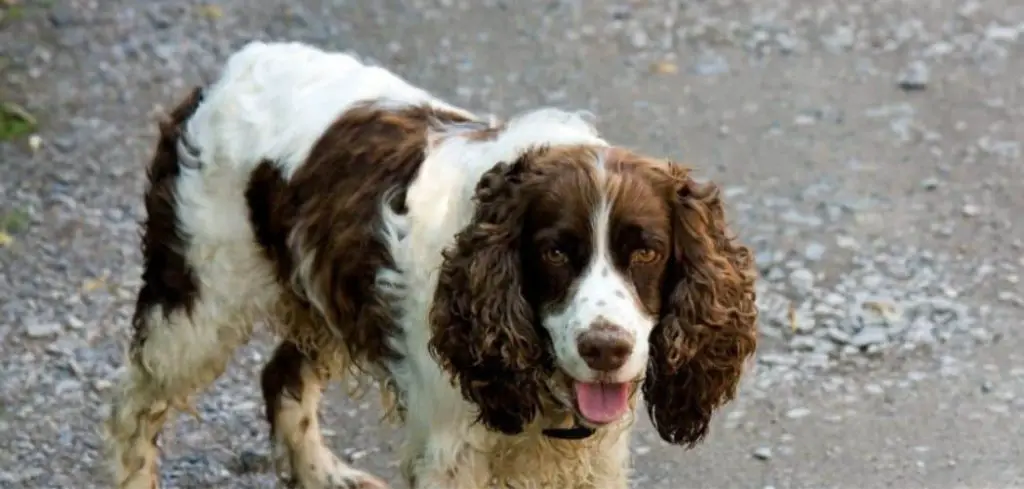Finding mucus in runny dog poop can be alarming for any dog owner. Loose stools combined with a slimy coating often point to a problem in the digestive tract.
While sometimes mild, these symptoms can also signal more serious health issues that need prompt attention.
We outline the common causes of mucus in a dog’s runny poop, what you can do at home, and when to seek veterinary help.
Table of Contents
Mucus in Runny Dog Poop — Why It Happens
Mucus in runny dog poop usually indicates that your dog’s intestines are inflamed or irritated. Common causes include dietary indiscretion, intestinal infections, parasites, stress colitis, food sensitivities, or more severe conditions like inflammatory bowel disease.
When mucus accompanies diarrhea, it typically means the lining of the intestines is producing excess lubrication in response to irritation.
This is the body’s way of trying to protect itself, but it also means something is upsetting your dog’s gut.

Mucus in Runny Dog Poop: Common Causes
Dietary Indiscretion
Dogs are notorious for eating things they shouldn’t — from table scraps to garbage.
When a dog eats fatty, spoiled, or indigestible food, the digestive system can become irritated, leading to diarrhea with mucus. Owners may notice sudden onset of loose stools, occasional vomiting, and discomfort.
While some cases resolve quickly, ongoing diarrhea after eating the wrong food may need veterinary care.
Read more: Dog Mucus Poop After Sedation (Why it happens)
Parasites
Intestinal parasites such as Giardia, whipworms, or roundworms can trigger mucus in runny stool.
These parasites damage the intestinal lining and interfere with normal absorption, causing inflammation and slimy diarrhea.
Puppies are particularly vulnerable, but dogs of any age can be affected. Left untreated, parasites can cause weight loss, weakness, and even life-threatening dehydration.
Stress Colitis
Stress can directly affect the colon, leading to colitis — inflammation of the large intestine.
Dogs under stress from boarding, travel, or major routine changes may suddenly develop runny stool with mucus.
Other symptoms include urgency to defecate and straining. While stress colitis is often temporary, repeated episodes may require veterinary evaluation.
Bacterial or Viral Infections
Pathogens such as Salmonella, E. coli, or canine parvovirus can inflame the gut and cause severe diarrhea with mucus.
Infections often bring additional signs such as lethargy, fever, vomiting, and loss of appetite.
Viral infections like parvo are especially dangerous in puppies and require immediate veterinary intervention.
Food Allergies or Intolerances
Some dogs react poorly to certain proteins or ingredients in their diet. When a food intolerance or allergy is present, the digestive tract may become inflamed, producing mucus in loose stool.
Symptoms may also include itchy skin, chronic ear infections, or recurring digestive upset. Identifying and eliminating the trigger food is key to managing this condition.
Inflammatory Bowel Disease (IBD)
IBD is a chronic condition where the immune system attacks the intestinal lining, causing persistent inflammation.
Dogs with IBD often experience chronic diarrhea with mucus, weight loss, and poor appetite.
Unlike simple stomach upset, IBD does not resolve on its own and requires long-term veterinary management with diet changes and medication.
What to Do If Your Dog Has Mucus in Runny Poop
If your dog has mild diarrhea with mucus but is otherwise acting normally, you can take some steps at home.
Withhold food for 12 hours to rest the digestive tract, while still providing fresh water to prevent dehydration.
Gradually reintroduce a bland diet of plain boiled chicken and rice in small portions.
Monitor your dog closely for any worsening signs such as lethargy, repeated vomiting, or blood in the stool.
You may also consider adding a veterinarian-approved probiotic to help restore gut balance. If the diarrhea improves within 24–48 hours, a gradual return to their normal diet may be safe. However, ongoing or severe symptoms should not be ignored.
When to Call or Visit Your Vet
Seek veterinary attention if your dog’s diarrhea persists longer than 48 hours, or if you notice blood mixed with the mucus.
Immediate care is also needed if your dog becomes very lethargic, refuses to eat or drink, or shows signs of dehydration such as dry gums and sunken eyes.
Puppies, senior dogs, and dogs with existing health conditions are especially vulnerable to fluid loss and should be seen by a vet right away.
If your dog has repeated episodes of mucus in runny poop, a vet can perform stool tests, blood work, or imaging to rule out parasites, infections, or chronic conditions.
Read more: Excessive Mucus in Dog Poop (What it really means for your dog’s health)
Key Takeaway
Mucus in runny dog poop is a sign of intestinal irritation, which can range from mild dietary upset to more serious conditions like infections or IBD.
While some cases resolve with simple home care, others require prompt veterinary attention to prevent complications.
Trust your instincts as a pet owner — if your dog seems unwell or the diarrhea doesn’t improve, contacting your vet is the best step to ensure their comfort and health.
